Which way is the best, and how, to be a hero (of the everyday)?
Reframe Your Life as a Hero’s Journey to Relieve Despair and Boost Mental Well-Being
I hope you’re all well, but this week I’ve been a bit down with the dying days of summer, and if you have too, we’re about to try and lift it together, with science and my personal experience of using a unique, and well-researched method, to reframe our lives that I am genuinely excited about! But, as always on Whichwayhow—and like every great Sherlock Holmes (!) story—unfortunately, it doesn’t always start in a good place…
Words: 3237
Reading Time: 14 mins
Key Findings
1) The Hero’s Journey can significantly increase your perceived Meaning in Life.
2) The Hero’s journey can be distilled into 7 elements: Protagonist, Shift, Quest, Allies, Challenge, Transformation and Legacy.
3) The Hero’s Journey Scale is a 21-item 7-factor scale to measure how each element manifests in a person’s life story.
4) A Restorying Intervention can be used to increase how meaningful your life feels.
5) Retaking the Hero’s Journey Scale Questionnaire after the restorying intervention can give you a measure of how your perceived Meaning in Life has improved.
What are the benefits of applying the hero’s journey to your life?
I sometimes struggle to understand what is the point of it all. I seem to go through life alone even though I’m married with two kids, working from home while my wife is out at work and the kids at school, following a daily routine like a treadmill, which can occasionally lead to despair, and may have contributed to my depression in the past, and three decades of alcohol abuse (which I wrote about how I overcame, in my book here, but anxiety and depression lingered.) I am apparently not the only one.
A study designed to “characterise rates of clinically documented diseases of despair over the last decade and identify sociodemographic risk factors” found that:
“From 2009 to 2018, the prevalence of alcohol-related, substance-related and suicide-related diagnoses respectively increased by 37%, 94%, and 170%. Ages 55–74 had the largest increase in alcohol/substance-related diagnoses (59% and 172%). Ages <18 had the largest increase in suicide-related diagnoses (287%).”[1]
But research has shown that applying the Hero’s Journey can significantly increase your perceived Meaning in Life.
“Eight studies and six supplementary studies point to a profound connection between the lives we live and the stories we tell. In particular, our findings show that seeing life as similar to the enduring and ubiquitous Hero’s Journey narrative can lend life deeper meaning [2].
The Hero’s journey can also enhance your Narrative Identify [3], which is a theory that we form our identity by the internalised and evolving story we construct about our own lives, with characters, plots, settings, and themes.
Studies have found that how we do this can improve our well-being and mental health.
“Research into the relation between life stories and adaptation shows that narrators who find redemptive meanings in suffering and adversity, and who construct life stories that feature themes of personal agency and exploration, tend to enjoy higher levels of mental health, well-being, and maturity.” [3]
Further benefits from research demonstrate that The Hero’s journey can also improve your: Resilience [4]; Personal Growth and Transformation [5]; Self-Efficacy [6]; Social Connection [7]; Sense of Purpose [8]; Cultural Resonance [9]; Positive Reframing [10]; and Emotional Processing [11].
Stories matter. None more so than the stories we form about our own lives. And the best way to do this is, drumroll please, by starting with the Hero’s journey!
So, what is the hero’s journey anyway?
Researchers distilled seven essential elements from Joseph Campbell’s seventeen stages, in ‘The Hero of a Thousand Faces’ describing the monomyth common to all stories:
1) Protagonist
2) Shift
3) Quest
4) Allies
5) Challenge
6) Transformation
7) Legacy
A comparison between the Classic Hero’s Journey and the Modern Hero’s journey is illustrated below:
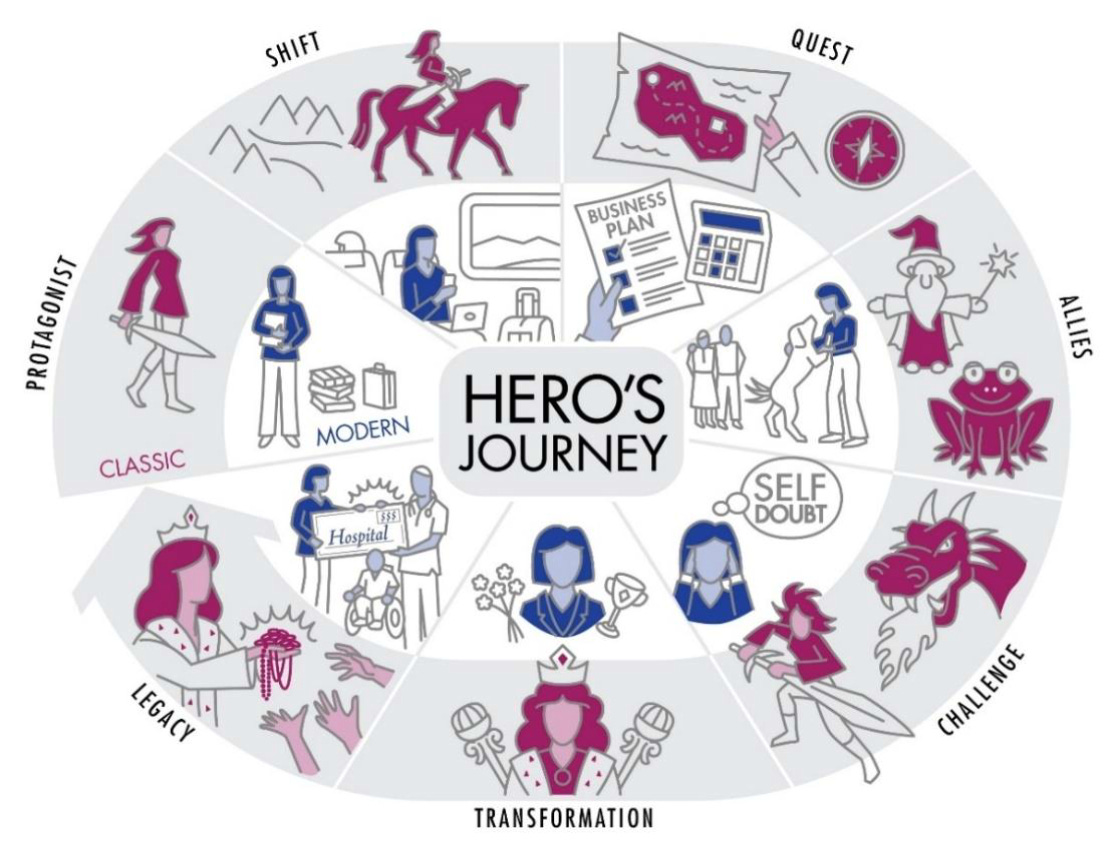
There is a description of each of these elements in the Table below, with an example of each from the Hero’s Journey Scale (HGS), which is “how a narrative element would manifest in a person’s life story’:
There are 21-items on the Hero’s Journey Scale on which participants rate themselves on a seven factor scale (1=Strongly disagree, 7=Strongly agree) with each being factor loaded and reverse-coded for certain items) depending on how strongly they agree or disagree with each of the following statements:
The Seven-Factor Hero’s Journey Scale Questionnaire
The Hero’s Journey Scale was found to be “a reliable measure that correlates with meaning life”, “predicted meaning in life above and beyond other narrative measures”, and “demonstrated high internal consistency… convergent validity and discriminant validity from unrelated constructs.” [2]
And the researchers developed a method, what they call a “Re-storying intervention”, that can be used to look back at “past experiences to emphasize or deemphasize certain events or reframe them within different narrative structures,” which is based on White and Epston’s (1990) classic work on restorying, and Embodied Restorying Practices. [12]
How to conduct a Re-storying Intervention
In order to learn more about your life story and how it has shaped you into the person you are today, it may help you to write your story and capture important details of your life for each of the distilled seven elements of the Hero’s Journey, using the following Intervention Writing Prompts in the Table below:
Before we consider how I applied this to my life, and if you have any doubts about the effectiveness of doing this, researchers concluded:
“The Hero’s Journey re-storying intervention does not just increase participants’ perceptions that their lives match a Hero’s Journey, it also increases how meaningful their lives feel, regardless of whether they initially perceived their lives as highly meaningful or not.” [2]
How I applied The Hero’s Journey Re-storying Intervention to improve well-being, reduce despair and depression, and improve my mental health
First, do the Hero’s Journey Scale Questionnaire, above, to determine your bench mark.
After rating yourself on each element, add up all your scores.
NB. Qs 5, 8, 9, 12, 15, 19, 21 are reverse coded (I didn’t mark these on the questionnaire above so as not to influence you while doing the questionnaire) so use the following table to calculate the true value:
1 becomes 7
2 becomes 6
3 becomes 5
4 stays 4
5 becomes 3
6 becomes 2
7 becomes 1
Although, as stated earlier, in the actual research study, “each being factor loaded”, the study also mentions that “exploratory factor analyses revealed that the Hero’s Journey Scale was unidimensional” which suggests that all items contribute to a single construct, so a simple sum of all items (after reversing where necessary) should still be appropriate.
Divide your total score by 21, to calculate an average score.
A higher average score (1-7) suggests your life story more closely aligns with the Hero's Journey narrative, as I propose, in a simplified form, below:
Results Table for Hero’s Journey
1 = Not at all aligned with the Hero's Journey
2 = Slightly aligned with the Hero's Journey
3 = Somewhat aligned with the Hero's Journey
4 = Moderately aligned with the Hero's Journey
5 = Considerably aligned with the Hero's Journey
6 = Highly aligned with the Hero's Journey
7 = Extremely aligned with the Hero's Journey
This is your benchmark result before using the re-storying intervention, and you will take the same questionnaire afterwards, ideally when some time has passed, like a few days, to see whether there is a significant difference in your results, and your life is indeed more meaningful and your well-being and mental health improved, which would be reflected in a higher average alignment with the Hero’s Journey.
My results before:
Please bear in mind, that I have written a book about my life so I already have a strong bias towards viewing my life as a story, overcoming difficulties and obstacles and becoming a better version of myself.
Still, I found it interesting to challenge myself on these questions, particularly the last few legacy questions.
I calculated my score as follows, by way of demonstration:
Calculating the total for The Seven-Factor Hero’s Journey Scale Questionnaire
Average: 117/21 = 5.57
Reading from the Results Table for Hero’s Journey, above, “5 = Considerably aligned with the Hero's Journey.”
Therefore, my average before the Hero’s Journey Restorying Intervention of 5 is considerably aligned with the Hero’s journey, which, like I said, may be because I have already written a book about my life.
This is a better result than I expected, to be honest, and I hope you are pleasantly surprised, too, if you try it, but I wonder if I can improve my score by undertaking The Hero’s Journey Restorying Intervention?
My Hero’s Journey Restorying Intervention
Step 1: Protagonist
What makes you, you? Think about your identity, personality, core value?
I am Mark, and I am married with two kids, and family is the most important thing in my life, I always put the needs of my kids first. I am kind, compassionate, sensitive and I have an inquiring mind and a love of learning. I used to be a teacher but now I work as a writer and an addiction, anxiety and depression counsellor. My core values are spirituality, I consider myself a Buddhist Christian, empathy, I try to see things from others’ perspective, and service, I am driven by trying to help others and make a positive impact on their lives.
Step 2: Shift
What change of setting or novel experience prompted your journey to become who you are today?
I used to be a grey-area drinker, successful in my teaching career, but increasingly dependent on alcohol to get by. After thirty years of alcohol abuse, I finally quit, which had a profound impact on my life, like taking the shackles off, and I felt free. I was literally like a different person, in a strange way, like being sixteen again, with open eyes about the world.
Step 3: Quest
What overall goal were you striving for that led to who you are today?
I was trying to regain control of my life, stop making stupid career decisions, but I didn’t really think beyond quitting alcohol. Once I did that, a new sense of purpose arrived, to help others do the same, so I studied Cognitive Behavioural Therapy (CBT), wrote a book about how I quit, and became a CBT Therapist.
Step 4: Challenge
What challenges or obstacles, such as a nemesis/rival or negative event, stood in the way of your journey?
Anxiety and depression still lingered, which I realised I had been trying to self-medicate with alcohol. This shift forced me to adapt, and find new solutions through therapy, spirituality, life-style changes, and writing, which I am still working on today. Sobriety is not the total solution I thought it was, but it was the start of trying to find one, and face the obstacles head-on.
Step 5: Allies
Who supported or helped you in your journey?
My wife was supportive in encouraging me to try anti-depressants, but they didn’t help, they were like a sticking plaster, and I tried AA, but that didn’t work for me, either. The only thing that helped was CBT therapy. The problem with my drinking was my thinking.
Step 6: Transformation
How did you personally grow as part of your journey to become who you are today?
It’s easy to forget how far I’ve come, because like a child getting taller, change happens gradually over time. I think I’ve grown stronger by facing my fears, and I think I am better at dealing with uncertainty. I am generally more positive, and I look for the good in people with loving-kindness. I know what suffering feels like, which helps me understand what my clients are going through.
Step 7: Legacy
In what ways has your journey left a legacy?
It has helped my clients grow, challenge their misconceptions and find better solutions, to lead more authentic lives and relieve their suffering. And hopefully my writing inspires and empowers readers to do the same. On a personal level, I think I am less selfish and a better father. I am not sure I am a better husband, though. Arguments hurt a lot more when you can’t forget them or relieve them with alcohol, and when you quit drinking, you also have to deal with the legacy of your drinking and its damage to the relationship, but I hope we are slowly getting there and rebuilding trust.
The next step is to retake the The Seven-Factor Hero’s Journey Scale Questionnaire, which I did the following day.
My results after:
Average: 109/21 = 5.19 = 5
Reading from the Results Table for Hero’s Journey, above, “5 = Considerably aligned with the Hero's Journey.”
Therefore, my average AFTER the Hero’s Journey Restorying Intervention of 5 is still 5, considerably aligned with the Hero’s journey, which I at first thought proves that it doesn’t make any difference, if anything very slightly worse! But then I realised the distribution of my scores was very different.
If I didn’t actually retake the test, I could have missed this. I definitely felt generally more positive about perceiving my life in many ways: having a clear narrative arc (3 vs 5), being a hero on a journey (3 vs 5), my life has a clear objective (5 vs 6), my life has no mission (3 vs 5), others won’t remember me (5 vs 6) I will have a lasting impact on others (5 vs 6) I have little effect on people (5 vs 1).
In conclusion, you have to analyse your individual scores to see how The Hero’s Journey Restorying Intervention has encouraged a meaningful and empowering change in your perspective on your life story and may have increased your feelings of purpose, resilience and personal growth, as it has mine.
Thank you for reading.
If you’d like to buy me a coffee you can do so below:
Please share this article to help others:
And if you don’t want to miss the next deep dive in a fortnight—which may be just what you need to solve your problem—subscribe for FREE below (No paid option, Whichwayhow.com is always free!)
If you enjoyed this post, you may also enjoy: Whichwayhow to do Breathwork, Whichwayhow to Journal and Whichwayhow to Reverse Cavities
References
[1] Brignone, Emily & George, Daniel & Sinoway, Lawrence & Katz, Curren & Sauder, Charity & Murray, Andrea & Gladden, Robert & Kraschnewski, Jennifer. (2020). Trends in the diagnosis of diseases of despair in the United States, 2009-2018: A retrospective cohort study. BMJ Open. 10. 10.1136/bmjopen-2020-037679.
[2] Rogers BA, Chicas H, Kelly JM, Kubin E, Christian MS, Kachanoff FJ, Berger J, Puryear C, McAdams DP, Gray K. Seeing your life story as a Hero's Journey increases meaning in life. J Pers Soc Psychol. 2023 Oct;125(4):752-778. doi: 10.1037/pspa0000341. Epub 2023 Mar 27. PMID: 36972106.
[3] McAdams, D. P., & McLean, K. C. (2013). Narrative identity. Current Directions in Psychological Science, 22(3), 233-238
[4] Masten, A. S. (2001). Ordinary magic: Resilience processes in development. American Psychologist, 56(3), 227-238
[5] Tedeschi, R. G., & Calhoun, L. G. (2004). Posttraumatic growth: Conceptual foundations and empirical evidence. Psychological Inquiry, 15(1), 1-18
[6] Bandura, A. (1997). Self-efficacy: The exercise of control. W.H. Freeman and Company
[7] Holt-Lunstad, J., Smith, T. B., & Layton, J. B. (2010). Social relationships and mortality risk: A meta-analytic review. PLoS Medicine, 7(7), e1000316
[8] Steger, M. F., Kashdan, T. B., Sullivan, B. A., & Lorentz, D. (2008). Understanding the search for meaning in life: Personality, cognitive style, and the dynamic between seeking and experiencing meaning. Journal of Personality, 76(2), 199-228
[9] Hammack, P. L. (2008). Narrative and the cultural psychology of identity. Personality and Social Psychology Review, 12(3), 222-247
[10] Gross, J. J. (2002). Emotion regulation: Affective, cognitive, and social consequences. Psychophysiology, 39(3), 281-291
[11] Pennebaker, J. W., & Seagal, J. D. (1999). Forming a story: The health benefits of narrative. Journal of Clinical Psychology, 55(10), 1243-1254
[12] White, M., & Epston, D. (1990). Narrative means to therapeutic ends. New York, NY: Norton & Company. See also, Flora, J., Boje, D., Rosile, G. A., & Hacker, K. (2016). A theoretical and applied review of embodied restorying for post-deployment family reintegration. Journal of Veterans Studies, 1(1), 129. https://doi.org/10.21061/jvs.41



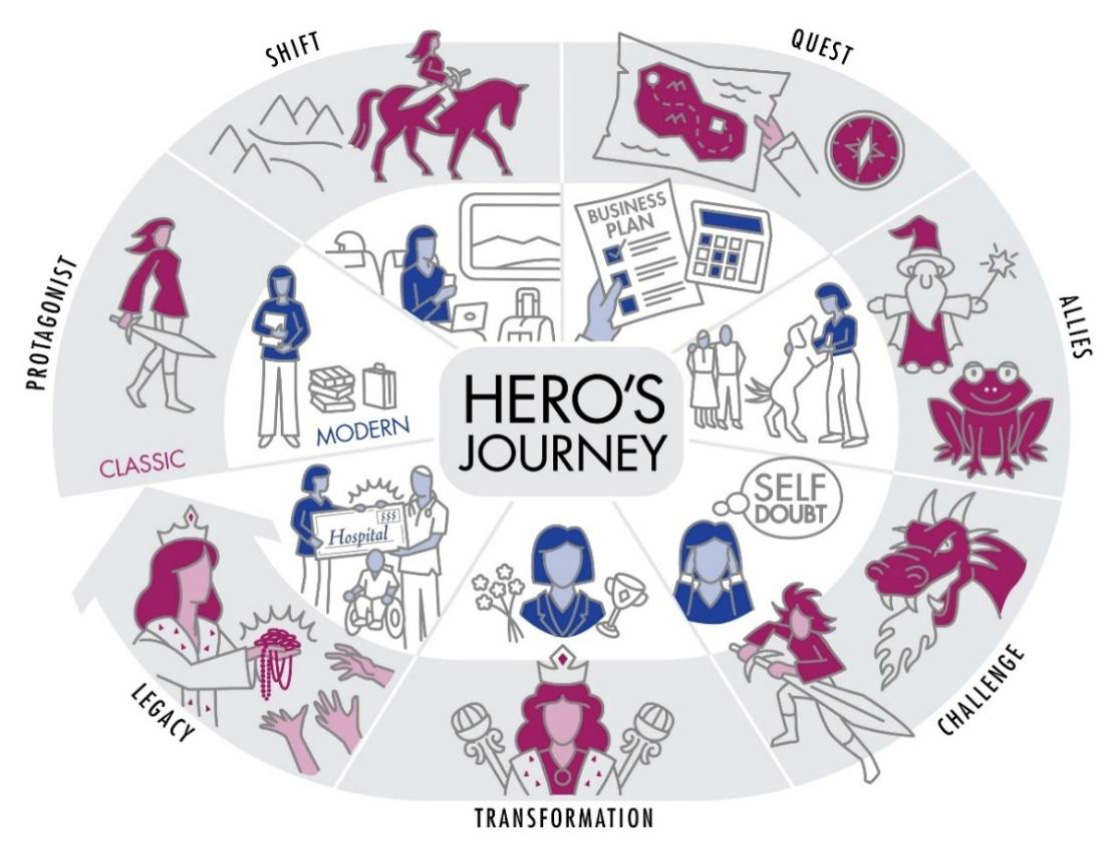
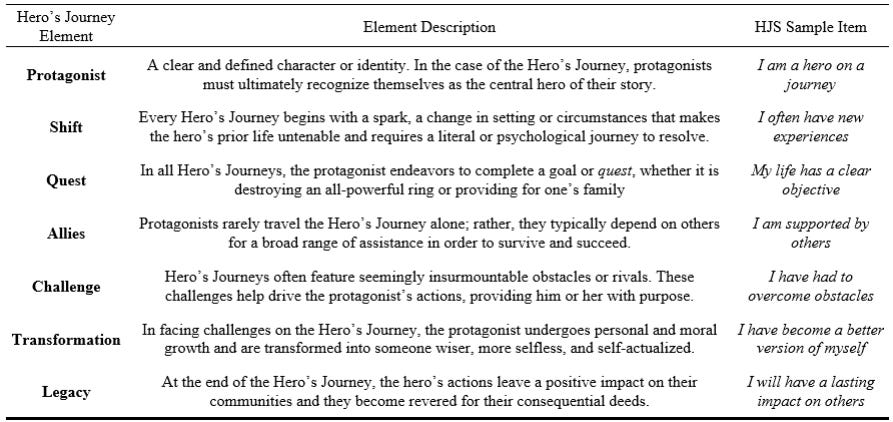

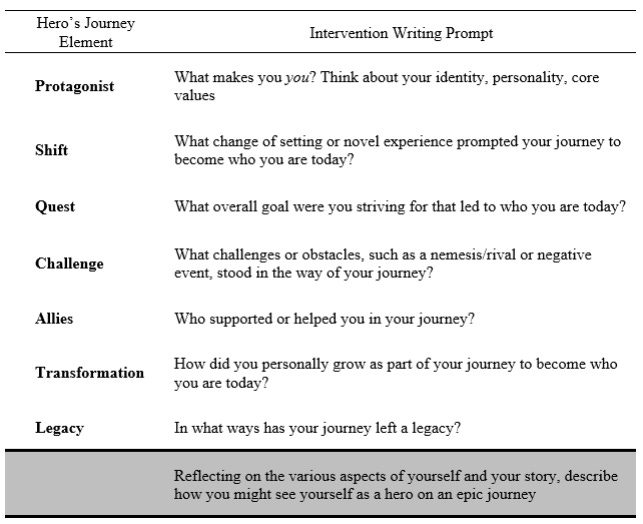
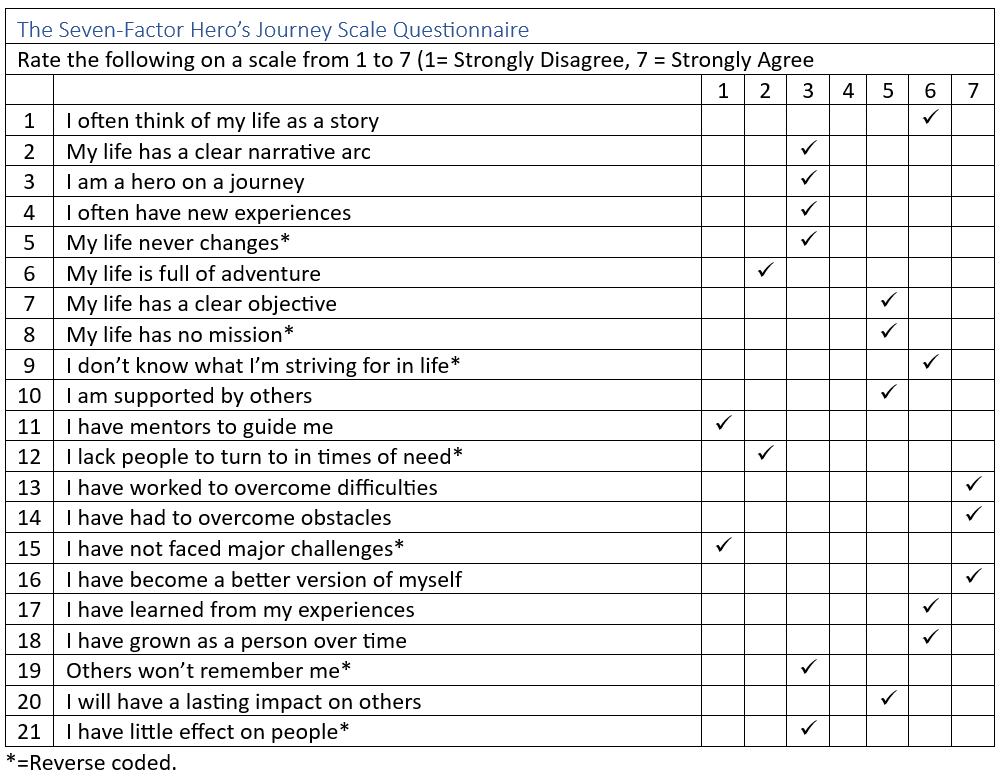



I'm going to talk to my daughter about this idea!
Really thought provoking read